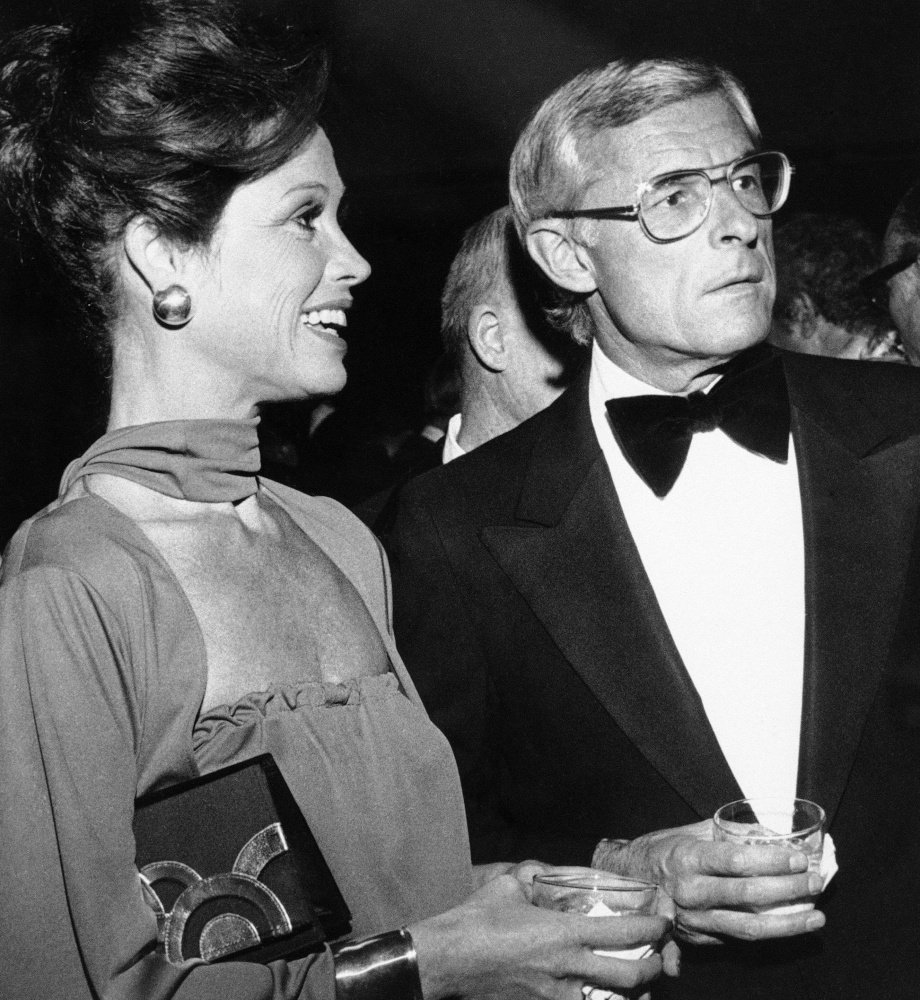His MTM Productions developed ‘Mary Tyler Moore,’ ‘Bob Newhart’ and ‘Hill Street Blues.’
Grant Tinker, the plain-spoken, silver-haired executive who led a prime-time renaissance at NBC and developed shows that helped redefine series television in the 1970s and ’80s, died Monday at his home in Los Angeles. He was 90.
The cause of death was not disclosed.
“Grant Tinker was a great man who made an indelible mark on NBC and the history of television that continues to this day,” NBCUniversal Chief Executive Steve Burke said.
Tinker’s company, MTM Productions, which he founded in 1970 with then-wife Mary Tyler Moore, helped change the course of television comedy over the decade that followed. Thanks to such series as “The Mary Tyler Moore Show” and “The Bob Newhart Show,” the juvenile escapism prevalent in the sitcom genre during the 1960s gave way to adult sophistication. The company also developed Steven Bochco’s innovative police show “Hill Street Blues,” which introduced a higher level of realism and new narrative structure to TV drama.
Appointed NBC’s chairman in 1981, when the network had been in a prolonged ratings slump behind CBS and ABC, Tinker helped achieve a major if gradual turnaround, opting to stick by low-rated but critically acclaimed programs – including “Cheers” – that eventually blossomed into long-running hits.
Other series introduced by NBC during those years included “The Cosby Show,” “Family Ties” and “Miami Vice.” David Letterman also began his late-night series after “The Tonight Show Starring Johnny Carson.”
The changes did more than just heighten NBC’s prestige. By the time Tinker left in 1986, after General Electric purchased NBC from RCA, the network’s profits had almost increased tenfold, to more than $400 million.
Tinker built his reputation as a hands-off manager who nurtured quality and stood behind it – an attitude that lured talent to NBC and MTM.
Bochco recalled approaching Tinker when he joined MTM, asking, “‘Do you have any thoughts about what you’d like me to be working on?’ He said, ‘No. We asked you to come to MTM to work on what you want to do.’ This was a guy who created an environment in which writers were genuinely free to create and produce their work.”
Tinker downplayed his role in the victories with which he was associated.
“I just had the good luck to be around people who did the kind of work that the audience appreciates,” he said in a 1994 interview coinciding with the release of his autobiography, “Tinker on Television.” “The success just rubbed off on me.”
Similarly, when Tartikoff died of cancer in 1997, Tinker credited him as the architect of NBC’s ratings turnaround. Reminded of his own contribution to that process, Tinker said only that the time for that would be in his own obituary.
Although he was associated with numerous Emmy-winning programs, Tinker was also willing to try commercial fare that he freely admitted was not to his personal taste. A key component of NBC’s success during the 1980s, for example, was the fanciful action show “The A-Team.”
When Tartikoff gave him the script, he nervously waited for Tinker’s response, finally calling to gauge his reaction. “It’s pretty good, if you like that sort of stuff,” he recalled Tinker saying.
Later, running his own production company, Tinker launched “Baywatch.” NBC canceled the show, which eventually became a long-running international smash in syndication. Eager to see the project find new life – and make NBC rue dropping it – Tinker sold the rights back to the producers for $10.
“I don’t have any problems with programming for mass audiences even a lowest-common-denominator show,” Tinker said in a 1983 interview. “I just don’t want to have ’em every night of the week.”
Tinker was born Jan. 11, 1926, in Stamford, Conn. After graduating from Dartmouth College, Tinker joined the NBC radio network in 1949 as a management trainee and became operations manager.
He left NBC in 1954, becoming deputy director of Radio Free Europe, but soon segued to the ad agency McCann-Erickson to develop TV shows.
Tinker worked in a similar capacity at another ad agency, Benton & Bowles, before returning to NBC in 1961 as a programming executive.
In 1970, Tinker and Moore (who had married in 1963, while “The Dick Van Dyke Show” was running on CBS) formed MTM, taking its initials from the actress’ name. The logo – a parody of MGM’s signature introduction – featured a kitten, instead of a lion, giving forth a soft meow.
MTM’s first program, “The Mary Tyler Moore Show,” turned into a hit for CBS, and a parade of hits followed: “The Bob Newhart Show,” “WKRP in Cincinnati,” and “Mary” spinoffs “Rhoda,” “Phyllis” and “Lou Grant” among them.
Even the medical drama “St. Elsewhere,” though never a major commercial success, was widely considered one of TV’s best programs.
Tinker and Moore’s 18-year marriage ended in 1981, the same year he began at NBC.
As part of his TV legacy, Tinker’s sons Mark and John have both become producers, with John working on “Chicago Hope” and Mark having spent several years on “NYPD Blue.”
“My father set the bar high both as a television executive and a father,” Mark Tinker said Wednesday.
Another son, Mike, became a Los Angeles police detective, who played bit roles on his brothers’ programs.
All four of Tinker’s children (the other being a daughter, Jodie) came from his first marriage, to Ruth Byerly, which ended in 1962.
Send questions/comments to the editors.



Comments are no longer available on this story